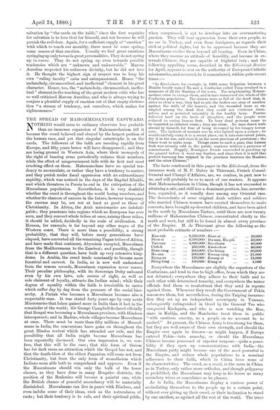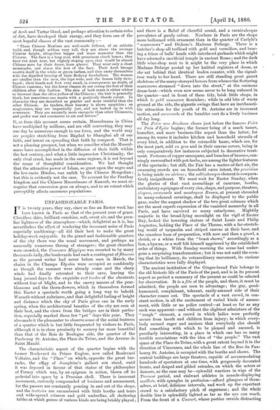THE SPREAD OF MAHOMMEDANISM EASTWARD.
NOTRING would seem to ordinary observers less probable than an immense expansion of Mahommedanism till it became the creed believed and obeyed by the largest portion of the human race, and yet that singular catastrophe is on the cards. The followers of the faith are receding rapidly from Europe, and fifty years hence will have disappeared ; and they are losing ground in Western Asia, where their monopoly of the right of bearing arms periodically reduces their numbers, while the effect of misgovernment falls with its first and most crushing effect on them. Mahommedans have no special ten- dency to accumulate, or rather they have a tendency to scatter, and they perish under fiscal oppression with an extraordinary rapidity, which was noticed in the days of the Bagdad Khalifs, and which threatens in Persia to end in the extirpation of the Mussulman population. Nevertheless, it is very doubtful whether the creed is throughout the world losing numbers, and whether its chances of success in the future, however temporary the success may be, are not at least as good as those of Christianity. In Africa, the Arab missionaries are indefati- gable; they penetrate into regions which no European has ever seen, and they convert whole tribes at once, raising those tribes, it should be added, decidedly in the scale of civilisation. A Houssa, for example, is far beyond any other negro of the Western coast. There is more than a possibility, a strong probability, that they will, before many generations have elapsed, have converted all the remaining Pagan tribes of Africa, and have made that continent, Abyssinia excepted, Mussulman from the Mediterranean to the Zambesi; and possibly, though that is a different question, have built up very extensive king. doms. In Arabia, the creed tends constantly to become more fanatical and earnest. In India, as is now well understood from the census records, Mussulman expansion never ceases. Their peculiar philosophy, with its Sovereign Deity unbound even by his own laws, sole source of right, as well as sole claimant of loyalty, attracts the Indian mind; while their dogma of equality within the faith is irresistible to castes which suffer day by day from the pressure of the social hier- archy. A Pariah who becomes a Mussulman becomes also a respectable man. It was stated forty years ago by very acute Missionaries that Islam gained more in India than it lost in the remainder of the world ; Sir George Campbell declared officially that Bengal was becoming a Mussulman province, with Hindoos interspersed ; and in Madras, whole villages become Mussulman at once. There must be more than fifty millions of Mussul- mans in India, the conversions have gone on throughout the great Hindoo revival which has attended our rule, and the possibility that all India might become Mussulman has been repeatedly discussed. Our own impression is, we con- fess, that this will be the case; that this form of theism has for dark races an attraction which the Gospel has not, and that the death-blow of the oldest Paganism will come not from Christianity, but from the only form of monotheism which Indians seem able both to comprehend and approve. Even if the Mussulmans should win only the bulk of the lower classes, as they have done in many Bengalee districts, the position of the Brahmins will become a painful one, while the British chance of peaceful ascendancy will be materially diminished. Mussulmans can live in peace with Hindoos, and even imbibe some of their ideas, such as the, naturalness of caste ; but their tendency is to rale, and their spiritual pride,
when compressed, is apt to develope into an overmastering passion. They will bear oppression from their own people, as we see in Turkey, and even from foreigners, as regards their civil or political rights, but to be oppressed because they are Mussulmans excites them beyond all bearing. Even in China, where they assume an attitude of humility, and become in ex- ternals Chinese, they are capable of frightful fury ; and the following appalling scene, described in the Edinburgh Review for April, appears to rest on the authority of European Catholic missionaries, and occurred, be it remembered, within quite recent times :—
" lu Kwei-chow, for example, in 1860, some litigation between a Muslim family named Ma and a Confucian called Tung resulted in a massacre of all the Muslims of the town. The neighbouring Moham- medans came to avenge them, and in turn massacred the whole of the Confucian population. The streets were so full of the dead that, in order to clear a way, they had to pile the bodies one atop of another against the walls of the houses ; and the wounded were so en- tangled among the dead that they could not extricate them- selves, and so perished miserably in the loathly heap. Famine followed hard on the heels of slaughter, and the people wore reduced to eating human flesh. To bury dead persons came to be regarded as criminal waste ; they ate them. No man dared walk abroad by himself, for fear of being devoured by his hungry towns- men. The luckiest of mortals was he who lighted upon a corpse ; he would carefully carry it to a secret place, cut it into convenient joints, dry it in the sun, and store it as the most precious of provisions ; the bones went to make soup. Things came to such a pass, that human flesh was actually sold in the public markets without a pretence of concealment. Happily, Monsignor Faurie succeeded in patching up the quarrel before it went any further, and since then it is said that perfect harmony has reigned in the province between the Muslims and the other Chinese."
The facts condensed in this paper in the Edinburgh, from the immense work of M. P. Dabry do Thiersant, French Consul- General and Charge d'Affaires, are, we confess, in part new to us, and will probably be so to most of our readers. It appears that Mahommedanism in China, though it has not succeeded in attaining a safe, and still less a dominant position, has, neverthe- less, expanded, as it usually does among any Oriental race. The descendants of some original Arab settlers and soldiers who married Chinese women have exerted themselves to make converts, have brought up deserted children, and have been aided in the north by Mussulman Tartars, until there are now twenty millions of Mahommedan Chinese, concentrated chiefly in the north and west, but still to be found in almost every province
of the Empire. M. de Thiersant gives the following as the most probable estimate of numbers :—
Kan-sul: ... 8,350,000 Shan-si 50,000 Shen-si ... 6,500,000 Ha-nan, Hu-pih 50,000 Yun-nan ... 4,000,000 Szo-chuen 40,000 Chih-li ... 250,000 Kwei-chow 40,000 Shan-tung ... 200,000 Che-kiang 30,600 Ho-nan ... 200,000 Kwang-tung ... 21,000 Kiang-su ... 150,000 Kwang-si 15,000 Shing-king 100,000 Kiang-si
... 4,000
Everywhere the Mussulmans are slightly the superiors of the Confucians, and tend to rise to high office, from which they are not debarred; everywhere they adhere to their faith and to each other with determined tenacity, and everywhere the minor officials find them so recalcitrant that they send in reports against them. Whenever they revolt the Government of Pekin massacres them, but nevertheless, during the Taiping insurrec- tion they set up an independent sovereignty in Yunnan, subsequently extinguished in blood by the General Tao who conquered Kashgaria, and who is now watching the Ras_ sians in Kuldja, and the Mandarins treat them in public " with cautious suavity, as a people on no account to be excited." At present, the Chinese Army is too strong for them, but they are well aware of their own strength, and should the Empire ever again be thrown—as might happen, if Europe entered Pekin—into anarchy, or should the Mussulman Chinese become possessed of superior weapons—quite a possi- bility if they open up communications with India—the Mussulman party might become one of the most powerful in the Empire, and reduce whole populations to a nominal adherence to their faith, which in China loses none of its characteristics. The creed, as a creed, is the same in China as in Turkey, only rather more orthodox, and though polygamy is prohibited, the Mussulman may keep in his house as many secondary wives or concubines as he pleases.
As in India, the Mussulmans display a curious power of assimilating themselves to the people up to a certain point, without ever giving up their creed, or their inclination to stand by one another, as against all the rest of the world. The trace
of Arab and Tartar blood, and perhaps attention to certain rules of diet, have developed their energy, and they form one of the most hopeful classes of the vast community :—
"These Chinese Muslims are well-made fellows, of an athletic build, and, though seldom very tall, they are above the average Chinese height, altogether bigger and more muscular than the Chinese. The face is a long oval, with prominent cheekbones; they have the Arab nose, but slightly sloping eyes, that would be almost Chinese save for their fierce, keen glance. They wear only a short moustache, and shave the rest of the face. Their Arab lineage asserts itself in the white or green turban, and they carry themselves with the dignified bearing of their Bedawy forefathers. The women are smaller than the men, the hips wide, and the bosom fully deve- loped ; their hands and feet very small, in consequence, no doubt, of Chinese customs; but the lower classes do not cramp the feet of their children after this fashion. The skin of both sexes is either whiter or browner than the olive-yellow of the Chinese; the hair is generally black, but sometimes one meets with a positively blonde colour. In character they are described as gentler and more truthful than the other Chinese. As traders, their honesty is above suspicion ; as magistrates, they are impartially just, and are looked np to with reverence. They are naturally more energetic than other Chinamen, and prefer war and commerce to art and letters."
If, as from this account seems certain, Mussulmans in China have multiplied by millions, and are still converting, they may one day be numerous enough to use force, and the world may see peoples stretching from Bagdad to Shanghai all of one faith, and intent on spreading that faith by conquest. That is not a pleasing prospect, but when we consider what the Mussul- mans have accomplished in the diffusion of their faith within the Fast century, and what a little impression Christianity, the only rival creed, has made in the same regions, it is not beyond the range of thoughtful consideration. We had thought that the attractive power of Islam, so great upon the negro and the low-caste Hindoo, was unfelt by the Chinese Mongolian ; but this is evidently not the case. To account for the Panthay kingdom and the Chinese Mussulmans of Kansuh, we must re- cognise that conversion goes on always, and to an extent which perceptibly affects enormous populations.



































 Previous page
Previous page